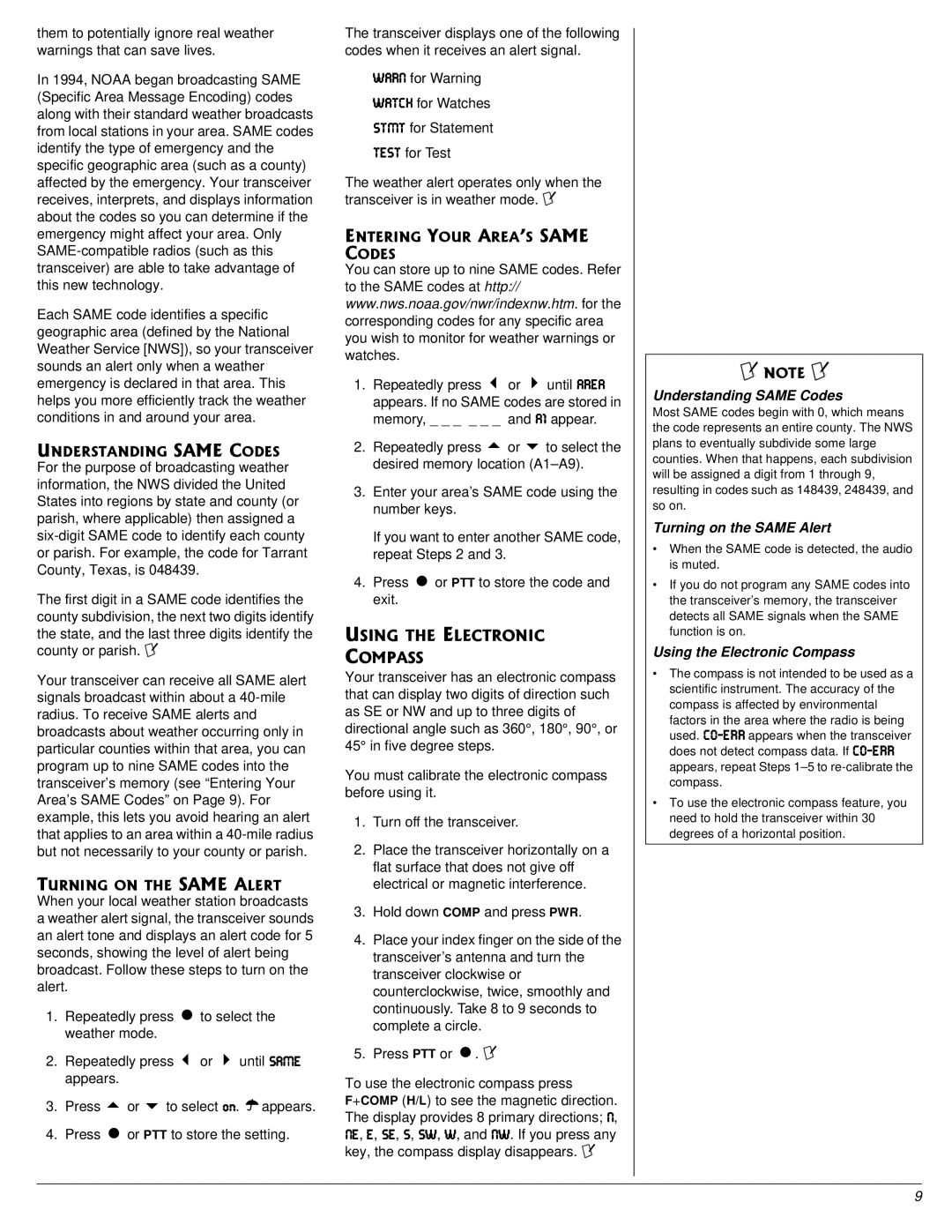
them to potentially ignore real weather warnings that can save lives.
In 1994, NOAA began broadcasting SAME (Specific Area Message Encoding) codes along with their standard weather broadcasts from local stations in your area. SAME codes identify the type of emergency and the specific geographic area (such as a county) affected by the emergency. Your transceiver receives, interprets, and displays information about the codes so you can determine if the emergency might affect your area. Only
Each SAME code identifies a specific geographic area (defined by the National Weather Service [NWS]), so your transceiver sounds an alert only when a weather emergency is declared in that area. This helps you more efficiently track the weather conditions in and around your area.
70&'456#0&+0)"5#/'"%1&'5 For the purpose of broadcasting weather information, the NWS divided the United States into regions by state and county (or parish, where applicable) then assigned a
The first digit in a SAME code identifies the county subdivision, the next two digits identify the state, and the last three digits identify the county or parish. ±
Your transceiver can receive all SAME alert signals broadcast within about a
6740+0)"10"6*'"5#/'"#.'46 When your local weather station broadcasts a weather alert signal, the transceiver sounds an alert tone and displays an alert code for 5 seconds, showing the level of alert being broadcast. Follow these steps to turn on the alert.
1. Repeatedly press | to select the |
weather mode. |
|
2.Repeatedly press 6 or 7 until I7C; appears.
3.Press 8 or 9 to select ed. rappears.
4. Press | or PTT to store the setting. |
The transceiver displays one of the following codes when it receives an alert signal.
M7HD for Warning
M7J9> for Watches
IJCJ for Statement
J;IJ for Test
The weather alert operates only when the transceiver is in weather mode. ±
'06'4+0)";174"#4'#N5"5#/'" %1&'5
You can store up to nine SAME codes. Refer to the SAME codes at http:// www.nws.noaa.gov/nwr/indexnw.htm. for the corresponding codes for any specific area you wish to monitor for weather warnings or watches.
1.Repeatedly press 6 or 7 until 7H;7
appears. If no SAME codes are stored in memory, _ _ _ _ _ _ and 7' appear.
2.Repeatedly press 8 or 9 to select the desired memory location
3.Enter your area’s SAME code using the number keys.
If you want to enter another SAME code, repeat Steps 2 and 3.
4. Press | or PTT to store the code and |
exit. |
|
75+0)"6*'"'.'%6410+%" %1/2#55
Your transceiver has an electronic compass that can display two digits of direction such as SE or NW and up to three digits of directional angle such as 360°, 180°, 90°, or 45° in five degree steps.
You must calibrate the electronic compass before using it.
1.Turn off the transceiver.
2.Place the transceiver horizontally on a flat surface that does not give off electrical or magnetic interference.
3.Hold down COMP and press PWR.
4.Place your index finger on the side of the transceiver’s antenna and turn the transceiver clockwise or counterclockwise, twice, smoothly and continuously. Take 8 to 9 seconds to complete a circle.
5. Press PTT or . ±
To use the electronic compass press
F+COMP (H/L) to see the magnetic direction.
The display provides 8 primary directions; D, D;, ;, I;, I, IM, M, and DM. If you press any
key, the compass display disappears. ±
±"016'"±"
Understanding SAME Codes
Most SAME codes begin with 0, which means the code represents an entire county. The NWS plans to eventually subdivide some large counties. When that happens, each subdivision will be assigned a digit from 1 through 9, resulting in codes such as 148439, 248439, and so on.
Turning on the SAME Alert
•When the SAME code is detected, the audio is muted.
•If you do not program any SAME codes into the transceiver’s memory, the transceiver detects all SAME signals when the SAME function is on.
Using the Electronic Compass
•The compass is not intended to be used as a scientific instrument. The accuracy of the compass is affected by environmental
factors in the area where the radio is being used. 9E#;HH appears when the transceiver does not detect compass data. If 9E#;HH appears, repeat Steps
compass.
•To use the electronic compass feature, you need to hold the transceiver within 30 degrees of a horizontal position.
9
